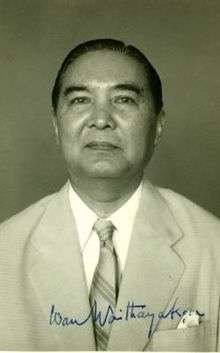Wan Waithayakon

Wan Waithayakon (full title: His Royal Highness Prince Vanna Vaidhayakara, the Prince Naradhip Bhongseprabhan), known in the West as Wan Waithayakon (1891-1976), was a Thai diplomat. He was elected President of the Eleventh Session of the United Nations General Assembly (1956-1957), while serving as Thailand's Permanent Representative to the United Nations.[1] He was a grandson of King Mongkut (Rama IV).[2]
Early life and education
Prince Wan was born on 25 August 1891 in Bangkok. He began his education at Suan Kularb School and Rajvidyalai (King's College) before continuing his education in England where he earned a degree with honours in history from Oxford's Balliol College.[1] Wan also attended the Ecole Libre des Sciences Politiques (better known as Sciences Po) in Paris.[3]
Career
Prince Wan began his career as a foreign service officer in 1917. He was appointed advisor to his half-brother, King Rama VI, in 1922. In 1924, he was promoted to the rank of under-secretary for foreign affairs, and was responsible for negotiating several important amendments to political and commercial treaties with Western powers.
He was sent to Europe again in 1926 as minister accredited to the United Kingdom, the Netherlands, and Belgium. During that period, he also served as head of the Thai delegation to the League of Nations, where he was active in a number of important commissions as member, vice-president, and president. Prince Wan returned to Thailand in 1930, to accept a professorial chair at the Faculty of Arts, Chulalongkorn University.
For the next 30 years, Prince Wan continued to serve his country in a number of important diplomatic missions, some of the notable milestones being negotiations with Japan in 1943 during World War II, representing Thailand at the Greater East Asia Conference, participation in the SEATO Council and the Bandung Conference, where he was elected rapporteur, and negotiations leading to Thailand's admission to the United Nations.
In 1947, Prince Wan was appointed ambassador to the United States and served concurrently as ambassador to the United Nations. In 1956, he was the president of the Eleventh Session of the United Nations' General Assembly.[3] He also served as Thailand's foreign minister from 1952 to 1957 and again in 1958.[4]
Language
Prince Wan's expertise in languages ranged from English and Pali to Sanskrit. He coined Thai words from English which are in use today. They include prachathipatai (democracy), ratthathammanoon (constitution), thanakarn (bank), and songkram (war). His proficiency in languages led to his being made president of the Royal Society of Thailand, the national arbiter of the Thai language.[1] Prince Wan won many academic honours and is regarded as one of the founding fathers of philological textual criticism in Thailand.[3]
Death
Prince Wan died on 5 September 1976, aged 85.[1]
Honours
Foreign honours
-
 Malaysia : Honorary Grand Commander of the Order of the Defender of the Realm (1964)[5]:1
Malaysia : Honorary Grand Commander of the Order of the Defender of the Realm (1964)[5]:1
| Diplomatic posts | ||
|---|---|---|
| Preceded by Rudecindo Ortega |
President of the United Nations General Assembly 1956–1957 |
Succeeded by Leslie Munro |
References
- 1 2 3 4 Kamjan, Chananthorn (3 September 2016). "The Prince of diplomacy". Bangkok Post. Retrieved 3 September 2016.
- ↑ "A Rotarian in the News". The Rotarian. February 1957. Retrieved 3 September 2016.
- 1 2 3 "Prince Wan Waithayakon (Thailand) Elected President of the 11th Session of the General Assembly". United Nations (UN). Retrieved 3 September 2016.
- ↑ List of foreign ministers of Thailand
- ↑ "Senarai Penuh Penerima Darjah Kebesaran, Bintang dan Pingat Persekutuan Tahun 1964." (PDF).
| Wikimedia Commons has media related to Wan Waithayakon. |